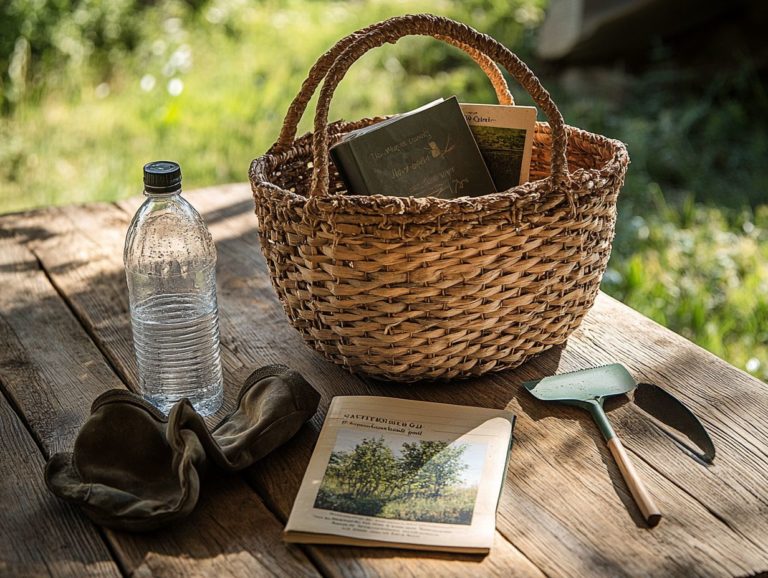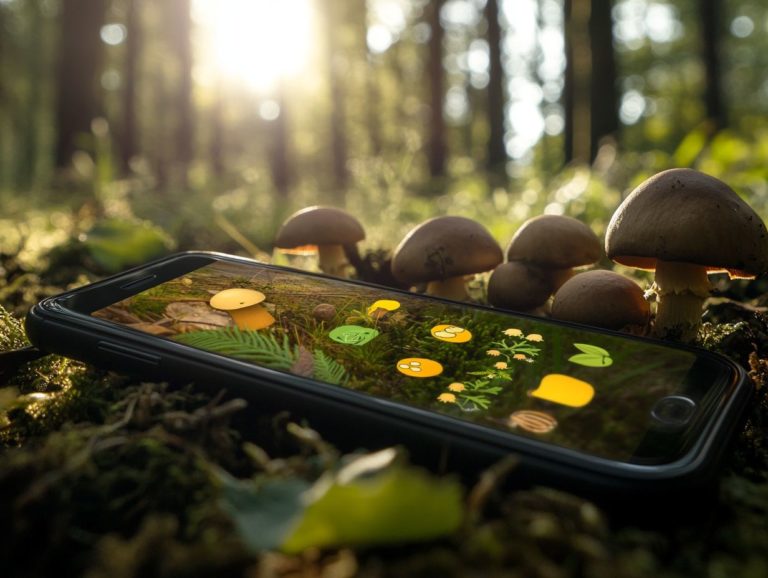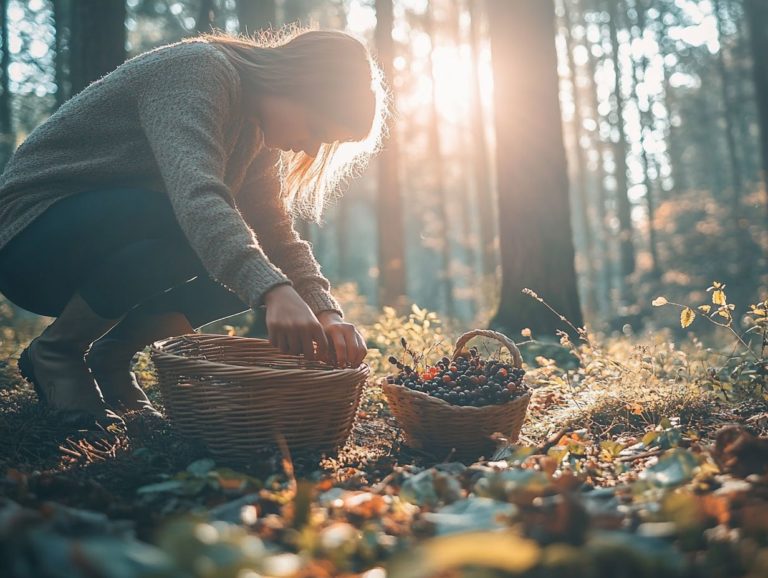What Are the Ethical Guidelines for Foraging?
Foraging, the art of gathering wild food, provides you with a remarkable connection to nature and fosters a profound appreciation for the environment around you.
Embracing this rewarding pursuit comes with the responsibility to follow ethical guidelines. It is essential to respect both the environment and private property while honoring Indigenous rights.
Understanding legal regulations and safety concerns makes your foraging adventures better. It also deepens your knowledge of the practice.
This article explores these key aspects that will empower your foraging journey!
Contents
Key Takeaways:
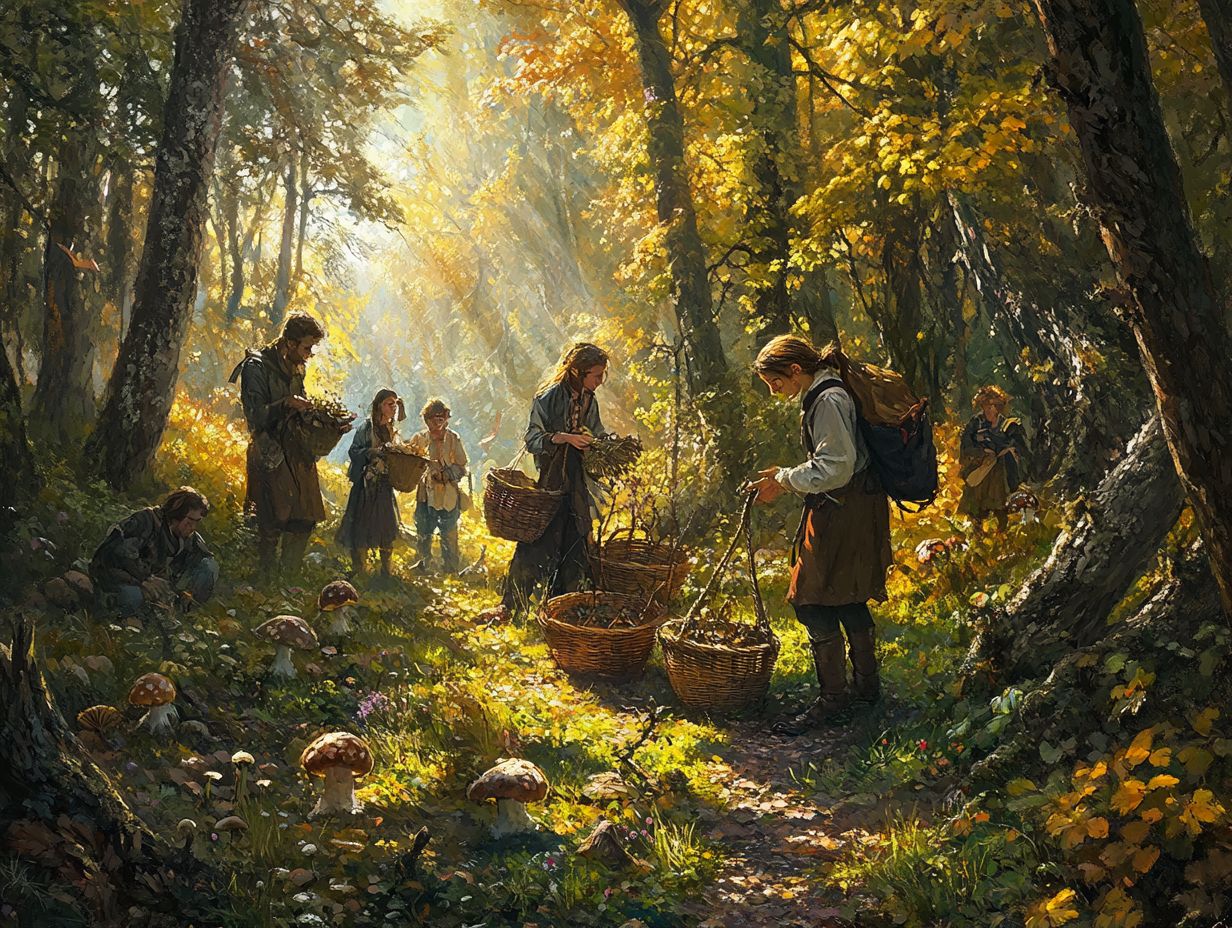
- Respect the environment by foraging responsibly, avoiding over-harvesting, and protecting the natural ecosystem.
- Always obtain permission before foraging on private property and respect the rights of Indigenous communities who may have cultural ties to forageable resources.
- Understand and follow local laws and regulations. Prioritize safety by properly identifying edible plants through plant identification techniques, avoiding toxic plants and contaminated areas, and using proper harvesting and preparation techniques.
Defining Foraging and Its Purpose
Foraging is the art of gathering wild food resources think plants and mushrooms straight from nature’s pantry. It allows you to connect deeply with your environment while using resources responsibly and ethically.
Historically, foraging has been a vital survival skill, embraced by Indigenous cultures worldwide who depended on local resources for sustenance. This rich tradition not only supported individual survival but also cultivated a profound relationship between communities and the ecosystems that surrounded them.
By engaging in foraging, you ll uncover insights into local food sources like nuts, berries, and edible greens. You’ll learn to identify seasonal variations and the diversity of life around you. The communal element of foraging enhances this connection, as groups gather to share knowledge, uphold respect for the land, and celebrate its abundant offerings.
This collective effort ultimately contributes to sustainable practices that honor both the Earth and its vibrant cultural heritage.
Ethical Considerations for Foraging
Ethical considerations in foraging are essential for ensuring that the practice benefits both the environment and the communities involved. As a responsible forager, it’s crucial to respect the environment, private property, and the rights of Indigenous communities. To fully understand these aspects, including the legalities of foraging, when gathering wild resources is important.
Following ethical foraging practices helps you connect more deeply with nature while promoting ecological balance, resilience, and community education regarding wild abundance.
Respecting the Environment
Respecting the environment is not just a choice; it s a cornerstone of ethical foraging that ensures wild ecosystems remain vibrant and diverse.
As a forager, you hold a pivotal role in preserving the intricate web of life. By grasping the significance of biodiversity the variety of different species in a certain area and its impact on ecosystem health, you actively contribute to a flourishing natural world.
Embracing sustainable practices like rotating your harvesting locations and avoiding over-picking helps maintain plant populations while creating habitats for various species.
Opting for hand tools instead of motorized equipment can dramatically reduce soil disruption and safeguard delicate habitats. It s essential for you to familiarize yourself with local regulations and engage in community initiatives that champion responsible gathering.
By weaving these practices into your approach, you not only nurture a thriving environment but also cultivate a deep respect for nature that can inspire those around you to do the same.
Ready to start foraging? Gather your tools, respect the land, and discover the wild foods waiting for you!
Respecting Private Property
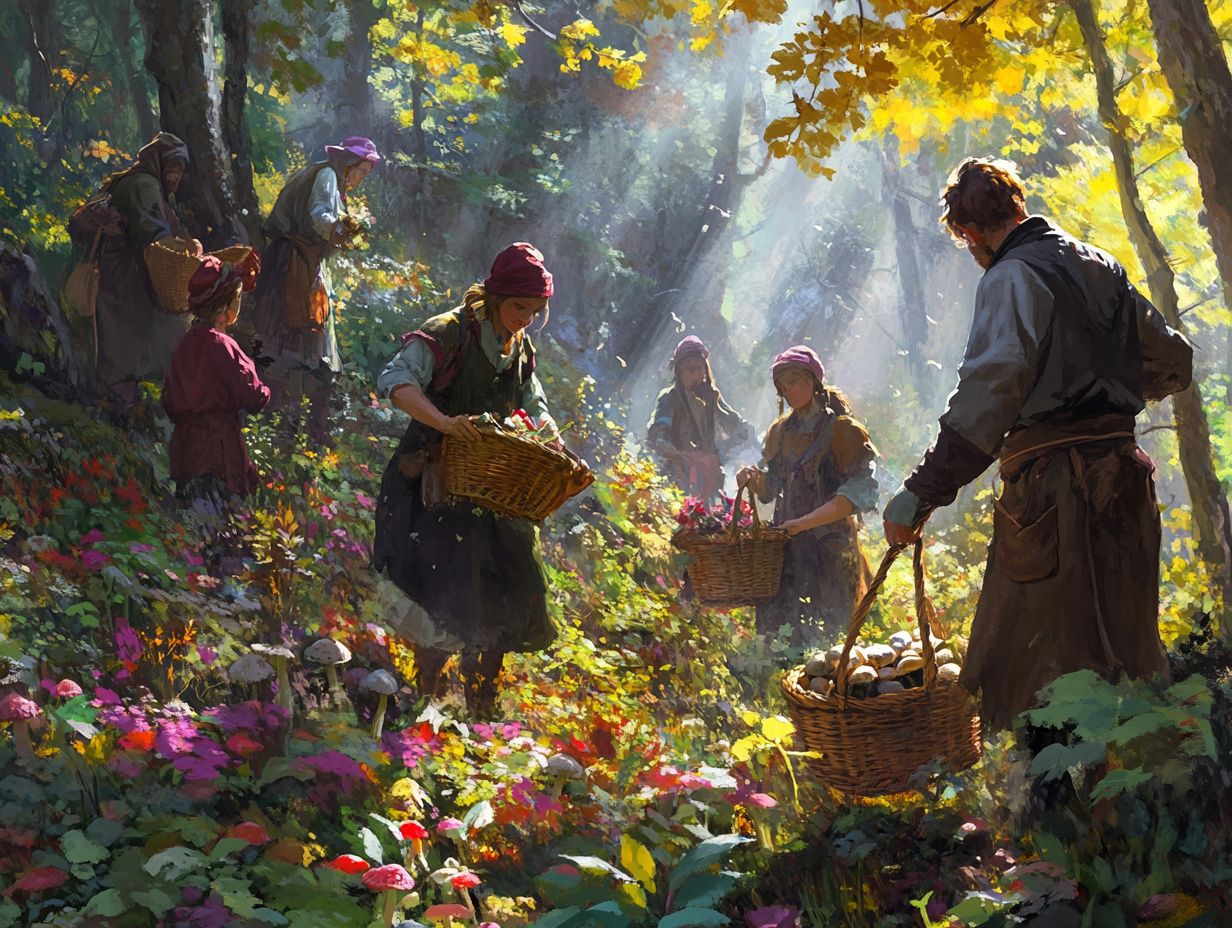
Respecting private property is essential for responsible foraging, as it upholds the rights of landowners and cultivates positive relationships within the community. Always seek permission.
Trespassing can lead to legal troubles and erode the trust between foragers and landowners. This respect aligns with responsible foraging practices and fosters community harmony.
Engaging with landowners demonstrates courtesy and opens doors to valuable knowledge about local flora and fauna, enriching your foraging experience. By approaching landowners politely, you can discuss your intentions and potentially gain insights into sustainable practices for the environment tailored to that specific area.
Keeping the lines of communication open encourages a sense of stewardship taking care of shared resources over shared natural resources, which helps alleviate concerns about overharvesting or the impact on local ecosystems. In turn, building a foundation of trust can prevent conflicts and positively shape how communities perceive foragers over time.
Respecting Indigenous Rights
Respecting indigenous rights is paramount in the realm of responsible foraging. These communities possess a profound connection to the land and its resources that should never be overlooked. As a forager, you have the responsibility to acknowledge and honor the traditional knowledge and practices of indigenous peoples, recognizing that their stewardship of the land is deeply rooted in cultural heritage.
By fostering a sense of reciprocity with the earth and actively engaging with indigenous communities, you not only enrich your own practices but also support the preservation of their cultures.
This collaboration truly matters; it acknowledges the wisdom of those who have cared for the land for generations and highlights the pressing need for sustainable practices for the environment. Engaging with indigenous communities can take many forms, like participating in workshops or educational events that focus on traditional foraging techniques and ecological practices. This two-way exchange allows you to learn from ancestral wisdom while contributing to the safeguarding of these cultures.
When you cultivate a mutual respect for the knowledge and practices of indigenous peoples, you deepen your understanding and appreciation for the natural world. This ensures that both the foraging community and indigenous cultures can thrive together, creating a harmonious relationship that benefits all. Let s work together to protect these traditions and resources before it’s too late!
Legal Guidelines for Foraging
Understanding the legal guidelines surrounding foraging is essential for you as a responsible forager. Knowing the laws helps you stay compliant and safe with local laws and regulations.
Different regions impose specific rules governing foraging on public lands, and these can vary significantly based on environmental considerations and community standards. By familiarizing yourself with these regulations, you can engage in responsible foraging practices while minimizing the risk of any legal repercussions.
Understanding Local Laws and Regulations
Understanding local laws and regulations is essential for anyone interested in foraging. These guidelines dictate what you can and cannot do on public lands and private properties. Different regions may have unique rules regarding the types of plants and mushrooms you can harvest, along with restrictions that vary by season and conservation efforts. As a responsible forager, it s crucial for you to stay informed about your local legal landscape to ensure that your foraging practices are ethical.
For example, in some areas, you might find that you re limited to harvesting only specific quantities of wild edibles, while in others, a special permit may be required for gathering. Many localities designate protected species that should never be picked, helping to preserve biodiversity and keep ecosystems intact. Understanding these regulations isn t just a legal obligation; it fosters a deeper respect for nature and its inhabitants.
Engaging in community workshops and utilizing resources like online forums can offer you valuable insights into gathering sustainably without infringing on local laws. This knowledge enables you to cultivate a richer relationship with your environment.
Dive into your local guidelines today and become a part of the responsible foraging community!
Foraging Safety Tips
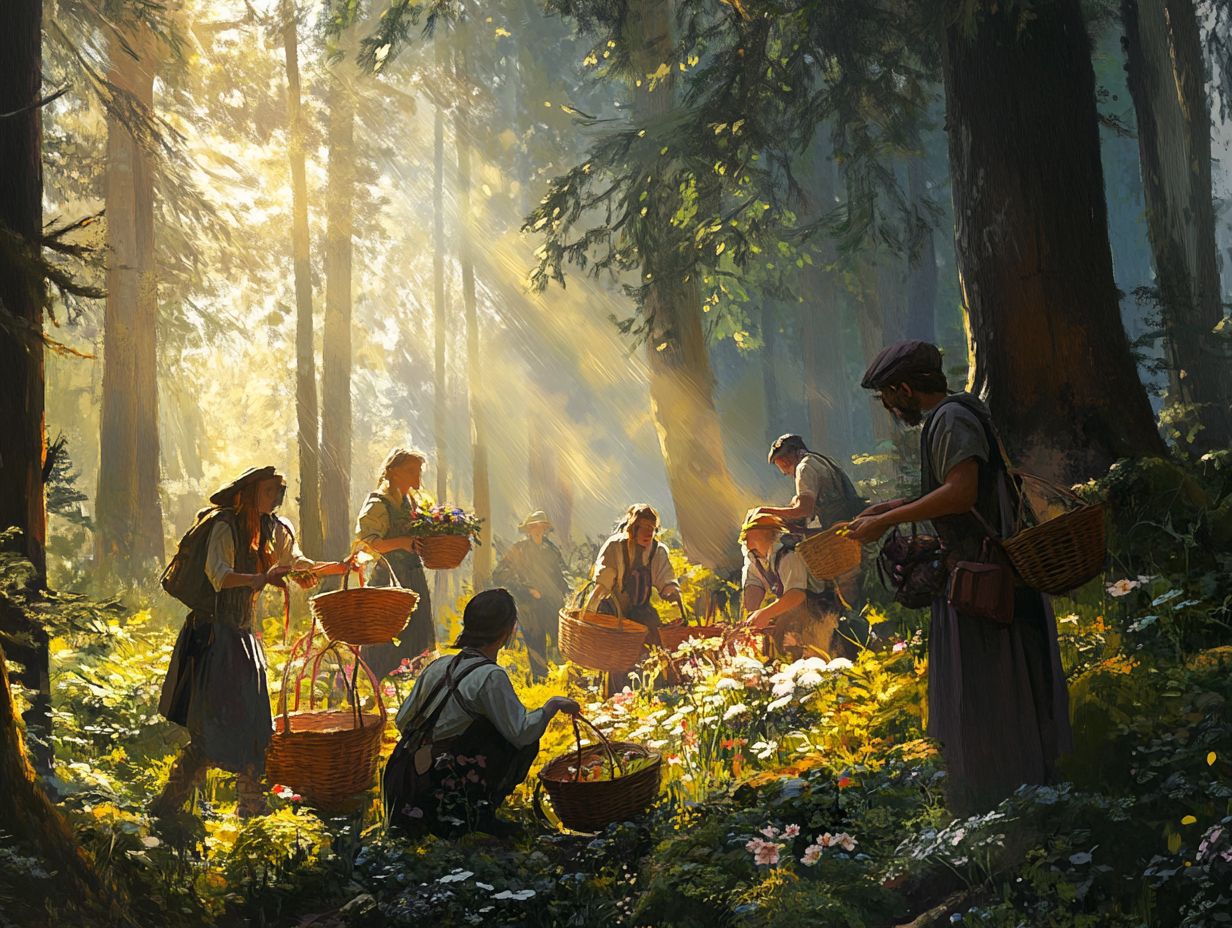
Foraging safety is crucial for everyone. It means carefully identifying edible plants and mushrooms while steering clear of toxic varieties.
Getting to know plant look-alikes and understanding the specific environmental conditions in which they thrive is key to safe foraging.
By employing proper harvesting techniques and staying informed through foraging books, you can reduce the risks of not finding food and ensure that your foraging adventures are both rewarding and safe.
Identifying Edible Plants and Mushrooms
Identifying edible plants and mushrooms is an essential skill for any forager, ensuring that the resources you gather are both safe and nutritious. Certain key species, like morel mushrooms, require specific knowledge to differentiate them from potentially harmful look-alikes.
You can also benefit from books. Engaging with local foraging groups or online forums allows you to share experiences and insights with fellow enthusiasts.
Field guides that feature vivid photographs and detailed descriptions are invaluable for distinguishing between common edible plants and their toxic counterparts. For example, wild garlic could easily be mistaken for lily of the valley, which poses serious risks if ingested.
Participating in workshops, hands-on foraging excursions, and even smartphone apps can greatly bolster your confidence and knowledge in identifying safe options.
Cultivating a deep understanding of local ecosystems not only enhances your foraging skills but also fosters sustainability and respect for nature.
Avoiding Toxic Plants and Contaminated Areas
Avoiding toxic plants and contaminated areas is crucial for your foraging safety, as ingestion can lead to serious health problems. You need to be vigilant and educate yourself on the characteristics of toxic plants and environmental factors that could lead to contamination, such as pollution or pesticides.
Familiarize yourself with both native and non-native species in your area, as some toxic plants may closely resemble edible ones. To ensure a safe foraging experience, consider using a reputable field guide, attending local workshops, or connecting with fellow foragers who can share their insights.
Always steer clear of areas near roads or industrial sites, where contamination is more likely. Use these strategies to make smart choices that elevate your foraging adventures while minimizing health risks.
Proper Harvesting and Preparation Techniques
Proper harvesting and preparation techniques are vital for your foraging safety, ensuring that the plants and mushrooms you’ve gathered are not only safe to consume but also sustainable. You should employ methods that minimize damage to both the environment and the plants themselves, practicing ethical foraging.
This stewardship protects the biodiversity of foraged areas and ensures these valuable resources remain available for future harvests. As you explore the world of wild edibles, focus on learning which species flourish in your local habitats and hone your skills in distinguishing between similar-looking plants.
In terms of preparing your bounty, it’s crucial to clean and store your foraged foods properly. Utilizing refrigeration and effective drying techniques will help retain both freshness and flavor.
Cooking methods like blanching a cooking method where you briefly boil food and then cool it rapidly or saut ing can elevate the taste while ensuring that any potential toxins are eliminated, making your foraging adventures a deliciously responsible choice.
Watch this informative video for a deeper understanding of safe foraging practices.
Frequently Asked Questions
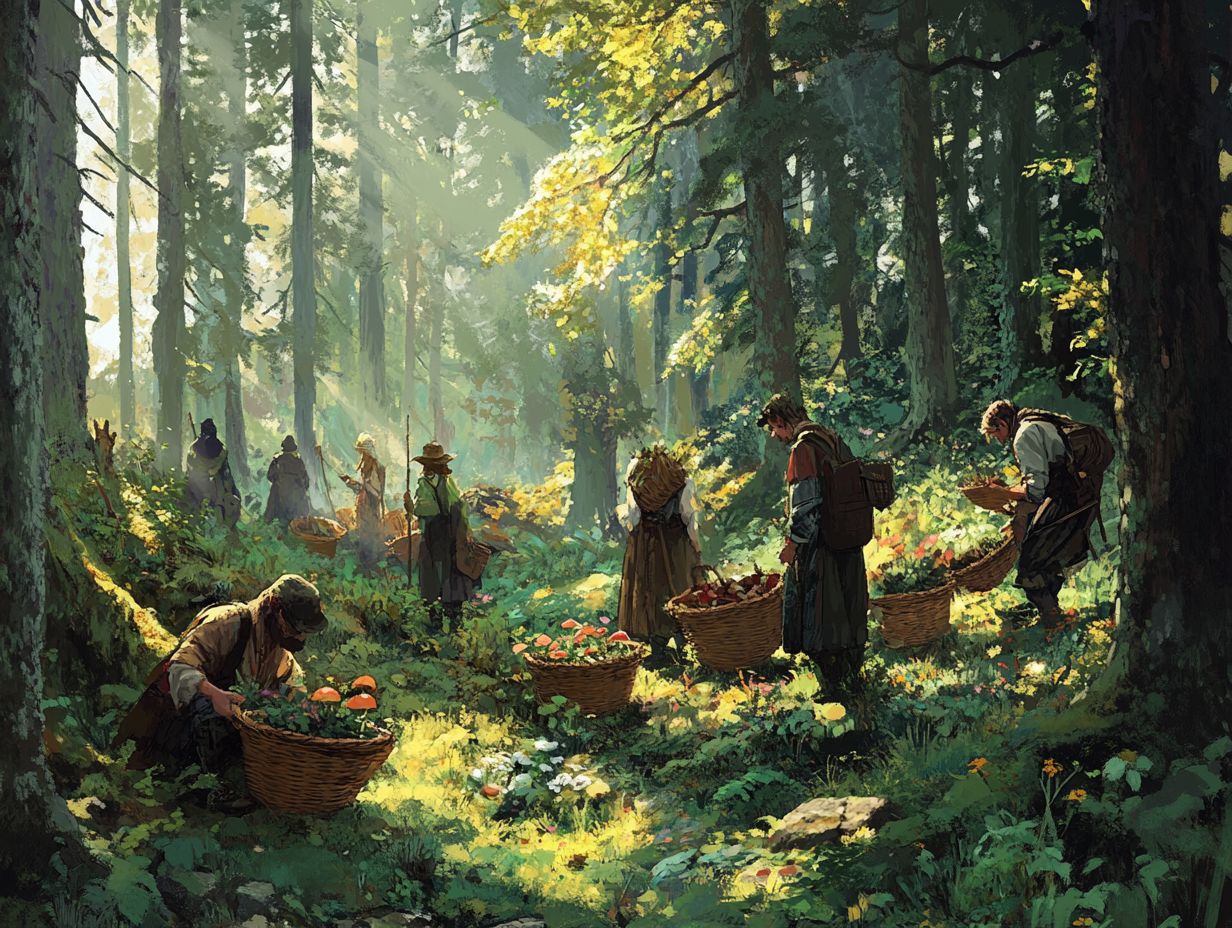
What Are the Ethical Guidelines for Foraging?
Ethical guidelines for foraging are principles that promote responsible and sustainable gathering of wild food. For more information, you can explore what you should know about foraging ethics, which ensures we respect the environment and fellow foragers.
Why is Following Ethical Guidelines Important?
Following these guidelines helps us forage responsibly. This preserves natural resources and supports sustainable practices.
Examples of Ethical Guidelines for Foraging
- Obtain necessary permits and permissions.
- Only take what you need.
- Respect private property and protected areas.
- Dispose of waste and litter properly.
- Leave enough resources for wildlife and other foragers.
How Can I Learn More?
Research reputable sources, like government websites or established foraging organizations. Consider joining workshops or classes led by experienced foragers.
Consequences of Ignoring Ethical Guidelines
Ignoring these guidelines can lead to serious problems, including environmental damage and legal issues. It can also harm relationships with fellow foragers and landowners.
How to Promote Ethical Foraging Practices
Lead by example! Follow ethical guidelines and educate others about their importance. Support organizations that advocate for responsible foraging to help raise awareness.


